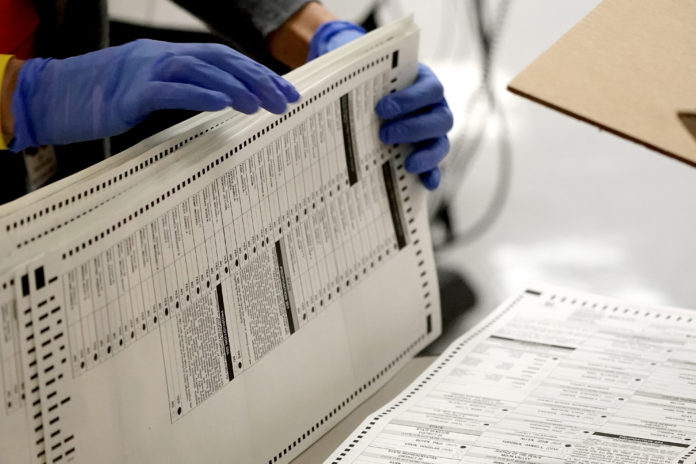
Arizona Republicans are pushing to create criminal penalties for election workers and volunteers who deviate from procedures and to give prosecutors all mail ballots rejected for signature problems.
Those provisions are part of a sweeping elections measure debated in the House on Tuesday ahead of a possible vote in the coming days as lawmakers rush to end the legislative session.
Democrats and voting rights advocates said the threat of criminal penalties will create a chilling effect on election workers and voters. The measure is advancing as Republican-controlled states push to enact more restrictive voting laws following former President Donald Trump’s 2020 loss. Trump and many of his staunch supporters have pushed unfounded allegations that the election was marred by fraud.
“Arizonans should be able to vote and make our voices heard without being subject to harassment, intimidation and criminal scrutiny,” a coalition of liberal groups and voting rights advocacy organizations wrote in a statement, which also called the bill “a real threat to Arizona’s ability to conduct free and fair elections going forward.”
The measure adopts a series of election changes pushed by Sen. Kelly Townsend, a Republican from Mesa. Republicans say they will bolster confidence in elections.
Some of the provisions appear to respond to conspiracy theories about the election, including a requirement that election data be stored in the United States. The measure also requires voters be offered a receipt for their ballot, imposes new restrictions on physical security of counting facilities and limits internet connectivity.
Democrats say some of the requirements are unworkable. They worry election workers will get bogged down writing ballot receipts, leading to longer lines at polling places.
But critics are especially concerned about the threat of criminal investigation or charges.
The measure, SB1241, would require county election officials to give to state or local prosecutors mail ballots that get rejected because the signature doesn’t match the one on file. Democrats say that will have an especially big impact on older voters, those with health conditions or disabilities that limit their motor skills, and younger voters who haven’t yet solidified their signature.
Voters with rejected signatures have until five days after the election to fix the issue. Ballots left unresolved at the end of that period would have to go to prosecutors.
“There is no good reason to be handing over these ballots and materials to the attorney general just because the voter wasn’t able to get in contact with the county recorder in time,” said Rep. Athena Salman, a Tempe Democrat. Even if they did nothing wrong, facing questioning from prosecutors would be intimidating for voters, she said.
Salman said she is also concerned about ballot secrecy, noting ballots and envelopes identifying the voter would be handed over to the offices of elected prosecutors whose own races may be on the ballot.
Out of about 1.9 million early ballots in November, Maricopa County was unable to resolve signature problems on 587 of them. Those ballots were not counted, along with another 1,455 that were returned without a signature.
The measure would also make it a misdemeanor to connect voting machines to the internet or to deviate from other election procedures.
Rep. John Kavanagh, R-Fountain Hills, said criminal penalties would only come into play for intentional violations of the law.
Arizona has been at the forefront of efforts by Trump supporters to cast doubt on the 2020 election. Republicans in the state Senate took control of ballots, equipment and data from Arizona’s largest county and hired a Trump supporter who has promoted election conspiracies to run an unprecedented partisan audit of the results.
President Joe Biden was only the second Democrat since World War II to win Arizona, a narrow victory powered by voters in Maricopa County, which includes the Phoenix area and 60% of Arizona’s 2020 voters.
Republished with the permission of the Associated Press.













